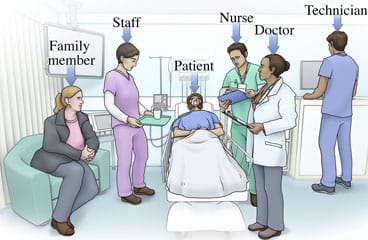Who works in the ICU?

You will work closely with staff in an ICU. ICU staff is more specialized than in other parts of the hospital. Here's some of the staff and what they do.
- Critical care medicine specialists: Medical doctors (or intensivists) who specialize in caring for people who are in the ICU.
- Specialists: Doctors who focus on certain areas of medicine. For example, a cardiologist might help treat a heart problem.
- Nurse practitioner: A nurse with advanced training.
- Nurse: Responsible for daily care and often a main point of contact for a patient's support network. Nurses keep patients as comfortable as possible. They closely watch the patient's condition, track vital signs, give medicines, and help with treatments. The nurses can also teach patients and their caregivers how to perform many daily tasks.
- Certified nursing assistant (CNA): A CNA, or nurse's aide, cares for patients under a nurse's direction.
- Respiratory therapist: Helps treat breathing problems. This may include managing ventilators and other breathing equipment.
- Physical therapist: Works with patients on exercises to help them move better and relieve pain.
- Technicians: Operate some of the equipment in the ICU. This may include X-ray machines, ventilators, and feeding equipment.
- Pharmacist: Prepares medicines and recommends the best and safest medicines.
- Social worker or family advocate: Helps patients and their loved ones in the ICU. They are your guide to the ICU. The social worker helps you understand how the ICU works and handles discharge planning when it's time to go home. They can also help if you need to communicate better with any members of the ICU staff.
- Chaplain: Attends to your religious or spiritual needs. Most hospitals have a chaplain or spiritual adviser available. You can request a spiritual adviser in your own tradition as well.
- ICU clerk: The administrative assistant for the unit. They keep track of everything that goes on in the ICU. This person can be a great contact for you.
- Cleaning, maintenance, and food service staff: Have special training for the ICU.
While the staff provides medical care, loved ones can provide support. They may also help make decisions about patient care. The staff knows that this is all new to you. They expect you to have questions. They will do their best to answer them.
What else should you know about the ICU staff?
Know that the ICU staff is highly trained to care for the patients in the ICU. They will do everything they can to help patients and families. They can also ask the hospital staff about counseling and support.
If you are there when the staff change shifts and when doctors visit, you can get to know the whole care team. You can make sure that you have a voice in ongoing care. You can advocate for your loved one.
How can you best communicate with ICU staff?
The ICU can be a stressful place. Changes in care in the ICU can happen quickly. So it can be helpful to keep a list of questions to ask staff. It can be important to understand:
- Moving of the bed, equipment, or machines because of patient changes on the unit.
- Changes in attending doctor because of staffing rotations.
- Who the best person is to talk with about specific medical care.
If you feel you are having problems communicating with the staff, talk to the ICU social worker or family advocate. This person can advise you and help with communication.
Where can you learn more?
Go to http://www.healthwise.net/patientEd
Enter I681 in the search box to learn more about "Learning About ICU Staff".
Current as of: October 1, 2025
Author: Ignite Healthwise, LLC Staff
Clinical Review Board
All Ignite Healthwise, LLC education is reviewed by a team that includes physicians, nurses, advanced practitioners, registered dieticians, and other healthcare professionals.

